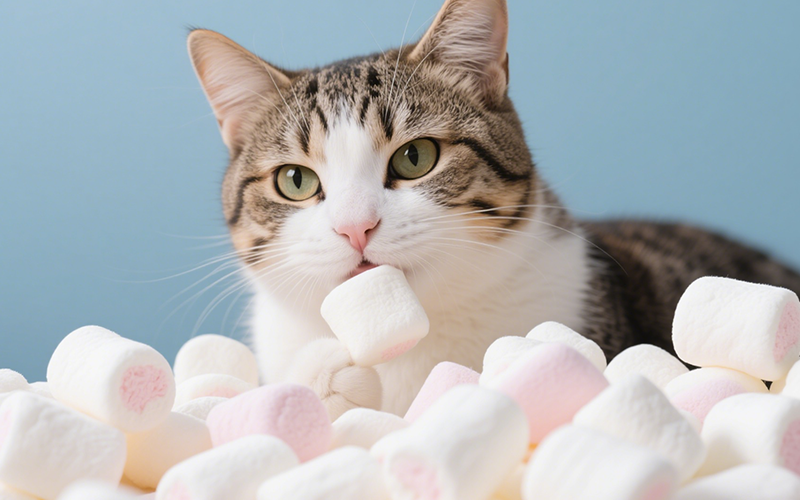Can Cats Eat Asparagus? A Safe and Healthy Option or a Risky Treat?
- 4 Mar 2025 10:46
Asparagus is a healthy vegetable that many people enjoy, but when it comes to our feline friends, the question arises: can cats eat asparagus? The good news is that yes, cats can eat asparagus in moderation, but there are some important considerations to keep in mind before offering it to your cat.
In this article, we’ll explore whether asparagus is safe for cats, the potential benefits and risks, and how to serve it properly.

Is Asparagus Safe for Cats?
✅ Yes, Asparagus Is Safe for Cats in Small Quantities
Asparagus is not toxic to cats, and they can safely consume it in small amounts. This vegetable contains beneficial nutrients like fiber, vitamin K, vitamin C, and folate, which are good for overall health. However, there are some things to consider before offering it to your cat as a treat.
❌ Risks and Considerations
Hard to Digest
Asparagus is a fibrous vegetable, and some cats may have difficulty digesting it. If your cat has a sensitive stomach or digestive issues, it’s best to avoid giving them asparagus.Choking Hazard
The thick stalks of asparagus can pose a choking hazard, especially for smaller cats. Make sure to cut the asparagus into small, manageable pieces to reduce the risk.Allergic Reactions
While rare, some cats may have an allergic reaction to certain vegetables, including asparagus. Watch for signs such as vomiting, diarrhea, or itchiness after introducing asparagus to your cat’s diet.Seasoning and Cooking Methods
Asparagus is often prepared with butter, garlic, or seasonings, which can be harmful to cats. Garlic and onions are toxic to cats and should be avoided. Always offer asparagus plain and unsalted without any added spices or oils.
Health Benefits of Asparagus for Cats
While cats are obligate carnivores and don’t require vegetables in their diet, some vegetables like asparagus can provide nutritional benefits when offered as an occasional treat.
1. Good Source of Fiber
Asparagus contains fiber, which can help support digestive health. A small amount of asparagus may help regulate your cat’s bowel movements, especially if they have issues like constipation.
2. Rich in Vitamins and Antioxidants
Asparagus is packed with vitamin K, which is essential for proper blood clotting and bone health. It also provides vitamin C, which supports the immune system and helps maintain a healthy coat.
3. Low in Calories
Asparagus is low in calories, making it a good treat for cats that need to maintain a healthy weight. Offering your cat small pieces of asparagus can serve as a low-calorie snack without the risk of overfeeding.
How to Safely Serve Asparagus to Cats
If you decide to feed your cat asparagus, make sure to follow these tips for safe preparation:
Cut the Asparagus Into Small Pieces
Break or cut the asparagus stalks into small, bite-sized pieces to reduce the risk of choking and make it easier for your cat to chew and digest.Cook the Asparagus Lightly
If you cook the asparagus, make sure it is steamed or boiled without any added salt, oils, or seasonings. Avoid frying or sautéing the asparagus with butter or spices, as this could be harmful to your cat.Introduce Asparagus Gradually
Asparagus should be offered as a treat, not a regular part of your cat’s diet. Start with small amounts to see how your cat reacts. If they experience any digestive upset or allergic reactions, stop offering asparagus.Monitor for Symptoms
If your cat eats asparagus for the first time, monitor them closely for 24-48 hours. Look out for any signs of vomiting, diarrhea, or lethargy, which may indicate that they had an adverse reaction.
Alternatives to Asparagus for Cats
If you want to provide your cat with a healthy snack, consider these cat-safe vegetables and treats:
Cooked Carrots – Low in calories and easy to digest.
Cucumber Slices – A refreshing and hydrating treat.
Pumpkin Purée – Great for digestion and high in fiber.
Cooked Sweet Potato – High in vitamins and fiber.
Cat-Specific Treats – Always a safe choice, as they are formulated for feline nutrition.
Final Verdict: Can Cats Eat Asparagus?
✅ Yes, cats can eat asparagus in small amounts as an occasional treat. It’s not toxic and can provide some nutritional benefits, such as fiber and vitamins.
⚠ However, be mindful of the preparation method, portion size, and your cat’s digestive sensitivity. Asparagus should only be served plain, without seasoning, and cut into small pieces to avoid any choking hazards or digestive issues.
💡 Want to keep your cat’s health in check? Consider using PettureX, an AI-powered pet health assistant that offers 24/7 online consultations and image recognition to help you identify pet-friendly foods and other health concerns. It’s the perfect way to stay informed and make the best choices for your cat’s well-being!
If you have more questions or need advice on other foods, don’t hesitate to ask! 🐱🌱
Related

Marshmallows and Cats: A Puffy Problem? Why Vets Say No to This Sugary Snack
- 22 Apr 2025
Kefir for Kitties? A Veterinarian-Reviewed Guide to Safety, Benefits & Risks
- 22 Apr 2025
The Burning Question: Can Cats Eat Jalapenos? A Comprehensive Safety Guide
- 21 Apr 2025
Cool Temptation: Can Cats Eat Ice Cream Safely? The Vet-Backed Truth
- 21 Apr 2025
Frankly Dangerous: Can Cats Eat Hot Dogs? Vet Explains the Serious Risks
- 16 Apr 2025
A Purrfect Protein? Can Cats Eat Ground Turkey Safely? (Vet-Reviewed Guide)
- 16 Apr 2025
Gritty Situation: Can Cats Eat Grits Safely? Vet Explains the Risks
- 16 Apr 2025
Gravy Danger Zone: Can Cats Eat Gravy Safely? (Vet-Reviewed Warning)
- 16 Apr 2025
Crunchy Query: Can Cats Eat Green Peppers? A Vet-Reviewed Safety Analysis
- 16 Apr 2025
Toxic Temptation: Can Cats Eat Grapefruit? Vet Explains the Dangers
- 16 Apr 2025
